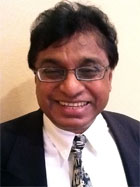|
 |
 |
|
| Date: 11 & 12 March 2026 (Wednesday & Thursday) |
|
| Time: 9:00am to 5:00pm |
|
| Venue: |
|
 |
|
 |
|
| Embracing Growth Mindset By Aslini Abdullah |
|
There are enviable individuals who acquire skills and knowledge effortlessly, others are more orderly and achievement- focused than are their peers and still others who exhibit unusual talents. While such positive traits are not evenly distributed, they are not necessarily out of reach for those who are not ‘natural’ high achievers.
A growth mindset is the belief that a person’s capacities and talents can be improved over time.
Resilience is a crucial skill we need to thrive in times like these, and believe there are ways to apply them at work for better productivity, harmony and creativity at work.
|
|
|
|
|
  |
|
 |
|
|
 |
 |
|
| Date: 13 March 2026 (Friday) |
|
| Time: 9:00am to 5:00pm |
|
| Venue: |
|
 |
|
 |
|
| Balanced Scorecard For Human Resources By Pagadala Cyril Papiah |
|
‘WHAT GETS MEASURED GETS DONE’
This adage has long been known to bring about results.
The programme describes how to set KPIs at all levels including at the individual level.
It also shows the role of management to get employees to achieve their KPIs.
It sets the customer as the focus of all employee efforts.
|
|
|
|
|
  |
|
 |
|
|
 |
 |
|
| Date: 3 April 2026 (Friday) |
|
| Time: 9:00am to 5:00pm |
|
| Venue: |
|
 |
|
 |
|
| Payroll Calculations under Employment Act & Labour Ordinance By Pagadala Cyril Papiah |
|
The Employment Laws covers the minimum terms and conditions of employment for ALL employees at ALL levels from top management to lowest level employees. This covers the Employment Act 1955, Labour Ordinance Sabah 2004 and Labour Ordinance Sarawak 2005
It is a basic human rights law for employer-employee relationships and must be known by all employers
It also provides some obligations and limitations from both employer and employee particularly in terms of work hours and OT and the administration of benefits.
(1) This programme is delivered in a simple easy-to-understand manner with the minimum use of legal jargon.
(2) Unavoidable legal jargons are also explained in a simple non-legal way.
(3) There are also plenty of workshop mini-case exercises for participants to practice on and become proficient.
|
|
|
|
|
  |
|
 |
|
|
 |
 |
|
| Date: 9 & 10 April 2026 (Thursday & Friday) |
|
| Time: 9:00am to 5:00pm |
|
| Venue: |
|
 |
|
 |
|
| 5 Stars Customer Service By Aslini Abdullah |
|
In today’s competitive business world, the primary differentiation between one company and another is service. With never-ending demands stemming from every direction, most people choose to hear, rather than listen, and in some occasions, the message can be misunderstood, resulting in costly errors in monetary terms and in some instances, professional relationships too get jeopardised.
Participants who attend this workshop will be coached to become better speakers and listeners, and will also be able to get other people to listen better to them. These skills, once mastered, is an effective tool which helps people avoid misunderstandings, increases the quality of customer service, develops concentration skills and creates solid professional and personal relationships.
To give an insight into Quality Customer Service and applying appropriate techniques in dealing with customers and effectively and professionally through telephone and e-mails.
|
|
|
|
|
  |
|
 |
|
|
 |
 |
|
| Date: 13 & 14 April 2026 (Monday & Tuesday) |
|
| Time: 9:00am to 5:00pm |
|
| Venue: |
|
 |
|
 |
|
| Have A Nice EQ Day!! (Emotional Intelligence Workshop) By Tee Keng Chai, Casey |
|
Would you like to be more effective in your work and in your personal life?
In today's fast-paced world of competitive workplaces and turbulent economic conditions, each of us is searching for effective tools that can help us manage, adjust, and strike out ahead of the rest.
By now, emotional intelligence (EQ) needs little introduction? EQ research and experience validate its importance as a critical factor in personal and business success. The need for emotional intelligence increases with higher levels of responsibility, such as management or parenthood, and becomes even more important with groups, such as work teams. EQ is not just important, but absolutely necessary for us to make good decisions, take action to solve problems, cope with change, and succeed.
Have a nice EQ day is a step-by-step program for increasing your emotional intelligence using the four core EQ skills - self-awareness, self-management, social awareness, and relationship management. With that, we are one step ahead in achieving goals and living our life to the fullest. |
|
|
|
|
  |
|
 |
|
|
 |
 |
|
| Date: 20 & 21 April 2026 (Monday & Tuesday) |
|
| Time: 9:00am to 5:00pm |
|
| Venue: |
|
 |
|
 |
|
| The Consultative Selling Skills Workshop By Tee Keng Chai, Casey |
|
The Consultative Selling is an international sales training programme. This training teaches your sales personnel’s not to become a product pusher but become a consultant to the clients.
This programme will coach the participants to apply the professional and most excellent sales stars. The basic belief of this programme is that we are responsible to awaken and utilise the potential stored within us. Our past success becomes our enemy if we settle for what we have. Do not let what you cannot do interfere with what you can do. In essence, we must refuse to be satisfied with our last accomplishment or discouraged by our present failure or obstacles because potential never has a retirement plan.
Participants will be learning The Consultative Selling Skills and begin to set goal and achieve them when they know how to use the power of their mind to achieve effective selling and negotiation skills to complete a deal. Participants will learn the selling strategy to build relationship, discover clients’ needs, presenting proposals and handle objections as well as closing the sales.
.
|
|
|
|
|
  |
|
 |
|
|
 |
 |
|
| Date: 20 & 21 April 2026 (Monday & Tuesday) |
|
| Time: 9:00am to 5:00pm |
|
| Venue: |
|
 |
|
 |
|
| Impactful Mentoring, Coaching and Counseling Skills By Raja Abdul Halim Raja Shah Kobat |
|
Mentoring is a process in which a more skilled or more experienced person, serving as a role model, teaches, sponsors, encourages, counsels and befriends a less skilled or less experienced person for the purpose of promoting the latter’s professional and/or personal development.
Mentoring functions are carried out within the context of an ongoing, supportive relationship between the mentor and mentee.
Counseling and coaching are skills that can be learned through persistence and patience. If you have a sincere desire to develop and support others and the self-discipline to practice the specific strategies, you can become proficient in these areas.
The rewards from improving your counseling and coaching skills are many. In our professional life, we can use these skills to create optimal working conditions which include: proper orientation and training for employees, establishing clear responsibilities and standards, providing appropriate guidance and support during times of transition and insuring increased motivation and productivity through effective feedback.
To enhance managers or supervisors on behavioral coaching skills with appropriate techniques in order to build better rapport with the staff and ultimately to produce efficient and effective work.
Behavioral Coaching is the key to creating a more open organization, one that values people- their skills, ideas and contribution- and genuinely seeks to empower individuals. To have effective behavioral coaching it must happen at every level in the organization.
|
|
|
|
|
  |
|
 |
|
|
 |
 |
|
| Date: 22 & 23 April 2026 (Wednesday & Thursday) |
|
| Time: 9:00am to 5:00pm |
|
| Venue: |
|
 |
|
 |
|
| Courageous Communication Workshop By Aslini Abdullah |
|
Courageous communication is speaking up with honesty care, and clarity about difficult or important issues, even when afraid, to foster growth, resolve conflict, and build trust, involving vulnerability, deep listening, and balancing with compassion for better outcomes in relationship and work.
It means challenging norms, personal truths, giving tough feedback, and addressing social topics, transforming avoidance into connection and growth.
|
|
|
|
|
  |
|
 |
|
|
 |
 |
|
| Date: 6 & 7 May 2026 (Wednesday & Thursday) |
|
| Time: 9:00am to 5:00pm |
|
| Venue: |
|
 |
|
 |
|
| Effective Time Management & Planning At Workplace By Aslini Abdullah |
|
This training will explore and practice the techniques of managing time and planning effectively towards those activities that will further professional and personal goals.
It can eliminate non-essential activities to achieve more and make work more enjoyable and rewarding.
Practicing good time management will create a person to be more productive and say no to impossible workloads.
|
|
|
|
|
  |
|
 |
|
|
 |
 |
|
| Date: 8 May 2026 (Friday) |
|
| Time: 9:00am to 5:00pm |
|
| Venue: |
|
 |
|
 |
|
| Handling Misconduct & Carrying Out A Domestic Inquiry By Pagadala Cyril Papiah |
|
Disciplinary action is the last resort in maintaining order in an organization. Some organizations do not take action for fear that if the action is not taken according to proper legally accepted procedures, it may backfire
This training shows how to handle cases of misconduct and indiscipline by employees and take ‘natural justice’ and legal disciplinary action including a domestic inquiry to try to prevent cases going to the Industrial Court.
At the end of the training, participants will have a better understanding of the industrial relations process.
|
|
|
|
|
  |
|
 |
|
|
 |
 |
|
| Date: 11 & 12 May 2026 (Monday & Tuesday) |
|
| Time: 9:00am to 5:00pm |
|
| Venue: |
|
 |
|
 |
|
| Improve Your "5Cs Skills" At Work By Tee Keng Chai, Casey |
|
What are 5Cs Skills. The 5Cs skills are Creativity, Critical Thinking, Communication, Commitment and Co-operation:
1. The ability to apply creative thinking to the gathering and analyzing of information.
2. The ability to look at problems critically
3. The ability to communicate effectively that make sense based on available information.
4. The ability to commit yourself to do an excellent job
5. The ability to co-operate with others and therefore others love to work with you.
Are you flooded with information and new knowledge on a daily basis? Unsure how to assess the credibility of new information? Not 100% confident you’re making valid decisions?
With interactive learning, combined with discussion, lecture, and case studies, this is your opportunity to learn creative skills to solve problem and make decisions to the best advantage of your business and career.
Whether you are a new or an experienced staff, this workshop is designed to enable you to develop the critical core abilities essential to success.
|
|
|
|
|
  |
|
 |
|
|
 |
 |
|
| Date: 11 & 12 May 2026 (Monday & Tuesday) |
|
| Time: 9:00am to 5:00pm |
|
| Venue: |
|
 |
|
 |
|
| Leading Effectively By Mentoring & Coaching By Raja Abdul Halim Raja Shah Kobat |
|
Mentoring & Coaching is a process in which a more skilled or more experienced person, serving as a role model, teaches, sponsors, encourages, counsels and befriends a less skilled or less experienced person for the purpose of promoting the latter’s professional and/or personal development.
Mentoring & Coaching functions are carried out within the context of an ongoing, supportive relationship between the mentor and mentee.
The rewards from improving your mentoring and coaching skills are many. In our professional life, we can use these skills to create optimal working conditions which include: proper orientation and training for employees, establishing clear responsibilities and standards, providing appropriate guidance and support during times of transition and insuring increased motivation and productivity through effective feedback.
|
|
|
|
|
  |
|
 |
|
|
 |
 |
|
| Date: 18 & 19 May 2026 (Monday & Tuesday) |
|
| Time: 9:00am to 5:00pm |
|
| Venue: |
|
 |
|
 |
|
| Management & Leadership Skills for Supervisors & Managers By Tee Keng Chai, Casey |
|
| This intensive two-day workshop is a highly interactive workshop designed for supervisors/managers who want to grow their management skills fast - and get on the fast track to achieving leadership success. Comprehensive leadership training will cover the proven management techniques and powerful strategies you need to become a stronger, more confident and respected leader.
You'll learn how to handle dozens of key management challenges with ease, including how to establish credibility and authority fast, how to motivate employees to give 110 percent, how to handle attitude problems and rule-breakers, how to curb absenteeism and tardiness, how to give constructive feedback and how to conduct effective performance appraisals.
As a workshop bonus, you'll receive self-assessment tools, handy checklists, the Leadership Style Analysis and numerous other resources that give you insight into how to build on your supervisory strengths.
Why risk your career by stumbling along, learning management skills by trial and error when you can get up to speed fast on essential management techniques and strategies? The management skills and knowledge you need to succeed are only a 2-day workshop away!
|
|
|
|
|
  |
|
 |
|
|
 |
 |
|
| Date: 18 & 19 May 2026 (Monday & Tuesday) |
|
| Time: 9:00am to 5:00pm |
|
| Venue: |
|
 |
|
 |
|
| Personal Empowerment Through NLP By Kumutha A/P Goovida Padachi |
|
Personal Empowerment Through NLP is a structured and experiential program designed to help participants understand how their thoughts, language, and internal patterns shape their behaviour and results.
This workshop focuses on practical application rather than theory alone. Participants will explore how limiting beliefs are formed, how emotional states influence performance, and how specific NLP techniques can be applied to create sustainable behavioural change.
The program integrates mindset awareness, emotional regulation, communication mastery, and goal design to support both personal growth and professional effectiveness. |
|
|
|
|
  |
|
 |
|
|
 |
 |
|
| Date: 22 May 2026 (Friday) |
|
| Time: 9:00am to 5:00pm |
|
| Venue: |
|
 |
|
 |
|
| EPF Act 1991, SOCSO Act 1969, EIS 2018 and OSHA1994 By Pagadala Cyril Papiah |
|
For the purpose of this training, the following laws are covered:
(1) The EPF Act 1991 is a mandatory retirement scheme for employees. This requires contribution by both employer and employee. It has benefits for employees (2) The SOCSO Act 1969 is a mandatory insurance scheme for employees for employment injury or invalidity (non-employment injury).This requires contribution by both employer and employee. Its has benefits for employees
(3) The EIS (Employment Insurance System 2018) is a mandatory insurance scheme for all retrenched employees. This requires contribution by both employer and employee. It has benefits for employees
(4) The Occupational Safety and Health Act 1994 (OSHA) mandates the appointment and functions of the Safety Officer and The Safety Committee in certain industries. This is of benefit to employer and employer as it aims to make the organisation a safe place to work.
This is a comprehensive training covering all relevant areas of EPF, SOCSO and EIS concerning employer and employee deductions and contributions according to the specified rates. Employers will also be able to advise their employees about the benefits and assist them in their claims.
The training also covers the functions of the Safety Officer and Safety Committee in an organization; and other safety issues
|
|
|
|
|
  |
|
 |
|
|